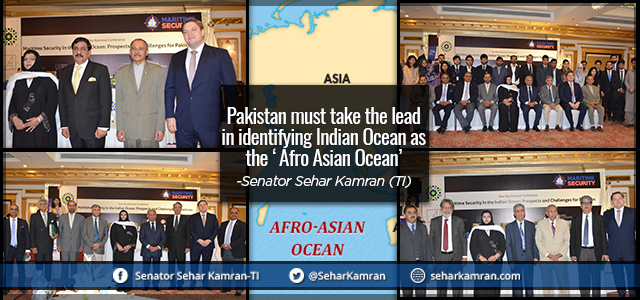 ISLAMABAD, March 27 2017: A day long national maritime conference on Monday called for a broad-based National Maritime Policy, modernization of navy, and expansion of diplomatic engagement with the littoral states of the Afro-Asian Ocean Region (more commonly known as Indian Ocean) for peace and security and capitalizing on the opportunities created by China-Pakistan Economic Corridor (CPEC).
ISLAMABAD, March 27 2017: A day long national maritime conference on Monday called for a broad-based National Maritime Policy, modernization of navy, and expansion of diplomatic engagement with the littoral states of the Afro-Asian Ocean Region (more commonly known as Indian Ocean) for peace and security and capitalizing on the opportunities created by China-Pakistan Economic Corridor (CPEC).
A set of 25 wide-ranging policy recommendations was issued at the conclusion of the conference on ‘Maritime Security in the Indian Ocean: Challenges and Prospects for Pakistan’, which had been jointly organized by Center for Pakistan and Gulf Studies (CPGS), Konrad Adenauer Stiftung (KAS), and National Center for Maritime Policy Research (NCMPR). The conference, which was participated by policy makers, legislators, maritime experts, and academics, further supported the idea of identifying Indian Ocean as ‘Afro-Asian Ocean’ to give a sense of ownership to the littoral states since the Ocean is bound by two continents. CPGS underscored the need for the formation of a broad and an inclusive National Maritime Policy. The Centre also called for the creation of a National Maritime Authority through effective coordinated strategies to implement Pakistan’s Maritime Policy goals.
The conference was held to analyse the challenges in realm of maritime security emanating from militarization and nuclearization of Indian Ocean and power projection by states maintaining presence in the area, emerging alliances in the region and threats to CPEC, in additional to non-traditional challenges like terrorism, piracy, food security and environmental concerns.
National Security Adviser Lt Gen (R) Nasser Khan Janjua, while underscoring the importance of maritime security, in his keynote said: “Inter-state tensions in the region and significant investments in blue water navies by countries like India have brought oceans into focus as sensitive security space.”
He said the vision of ‘Asia’s century’ was under stress because “security architecture and strategic stability of the region has come under stress”. In this regard, he pointed towards Indo-US logistics exchange agreement, through which he said, “India and US have carved out space to pre-position themselves on this ocean. India, he said, was being propped up as a counter-weight to China through geo-political, geo-economic and geo-military moves.
The conference recommendations underscored the importance of overcoming the ‘sea-blindness’, because of which maritime issues have remained neglected in the national priorities, and developing a culture of ‘sea-positivity’.
Unveiling the recommendations of the conference, President CPGS Sehar Kamran said: “Maritime Security is a pivotal aspect of Pakistan’s national security, and must be acknowledged as such. A comprehensive and long-term maritime security policy with a futuristic approach based on projected requirements for the coming decades in both civilian and military maritime sectors is the need of time. Furthermore the issue identified with the nomenclature be resolved and the Ocean should be renamed as the Afro-Asian Ocean. As from a geopolitical – or even simply a geographical perspective – the name `Afro-Asian Ocean` seems to be more pertinent for an Ocean that not only touches the Indian coast but also comprises the entire east coast of Africa, the south coast of Arabia, the western shores of Iran and Pakistan as well as Malaysia, Indonesia and Australia.” She also stated that fulfillment of the vision of ‘Asian Century’ needs a focus on 3Cs – connectivity, cooperation, and communication.
While speaking at the concluding session, Defence Production Minister Rana Tanveer said, “There is no surprise that our competitors are opposed to CPEC, and are already seeking to sabotage it. It is of the utmost importance, therefore, that we be fully-prepared to deal with any and all challenges that may arise as these opportunities unfold, not the least in the maritime arena.”
The recommendations placed special emphasis on Pakistan taking the lead in identifying Indian Ocean as the Afro-Asian Ocean as well as on the development and modernization of Pakistan Navy for being the guardians of the maritime boundaries. “Pakistan should increase and modernize its naval fleet, and pursue technological advancements in sea-based deterrents to ensure an assured second strike capability, especially in the context of the growing threats in the AAOR by our belligerent neighbor.”
Former Naval Chief Admiral (R) Muhammad Asif Sandila NI(M) HI(M) raised the issue of problems confronting development of Gawadar and called for addressing these challenges for the development of Gawadar and CPEC.
Rear Admiral Mukhtar Jadoon, former additional secretary Ministry of Defense, cautioned that “The available resources are inadequate to meet the maritime security dictates.”
Importantly the conference recommended greater diplomatic engagement with littoral states in Afro-Asian Ocean Region to promote mutual trust and cooperation in development of the region, besides enhancing Pakistan’s access to African markets. It called for a review of UN Resolution 2832 that declares this Ocean as Zone of Peace to address the concerns of littoral states including its nuclearization. “Pakistan must take the initiative in strongly opposing the increased instability produced by the introduction of nuclear weapons by India” in the Ocean.
It was proposed that India may also be roped into the connectivity net as it was identified as the only way forward towards promoting peace and stability in the region and ensuring the security of investments like CPEC.
Other recommendations related to promoting investments, skills development, equitable distribution of opportunities created by CPEC, and improved governance and security within Pakistan.
Former Deputy Chief of Naval Staff Vice Admiral (R) Iftikhar Rao HI(M) said: “If we have the requisite infrastructure and enabling environment at Gwadar and the region, Gwadar will surely emerge as the economic hub of the region.” He stressed that Iranian port Chahbahar poses no challenge to Gawadar and the two can compliment.
Rear Admiral (R) Pervaiz Asghar, Former Director General, National Centre for Maritime Policy Research, pointed to threat of India’s naval expansion, but also drew attention to non-traditional threats. He asked for “a coordinated and unified response to an array of common non-traditional threats that are increasingly becoming the norm.”
Dr Safdar Sohail, Executive Director General, Domestic Commerce, Ministry of Commerce, focused on the trade and investment related aspects stating that geo-economics is vital and we need to integrate domestic commerce.
Mr Zaheer-ud-din Dar, Chief Executive Centre for Social Education and Development spoke on the new emerging aspects of globalization in the context of the China Pakistan Economic Corridor. He said the soft power of China is taking a lead in globalization and One Belt One Road (OBOR) is agenda of cooperation of China’s soft power.
Mr Ahmer Bilal Soofi, Former Interim Law Minister shed light on spoke on the legal aspects of maritime security. He highlighted the need for domestic legislation on acquiring offshore resources.
Mr Syed Muhammad Ali, Senior Research Fellow, CISS, focused on the Evolution of Naval Nuclear Capabilities: Implications for Strategic Stability. In his speech he opined that it would be a good idea to establish a hotline between senior naval officials of Pakistan and India in order to prevent any future escalation.
Commodore Zafar M. Tipu SI(M), Director, Maritime Policy Research Centre, highlighted the importance of international cooperation and construction of multilateral maritime security mechanisms. He said littoral states are the biggest stake holders in maritime security of Indian Ocean.


